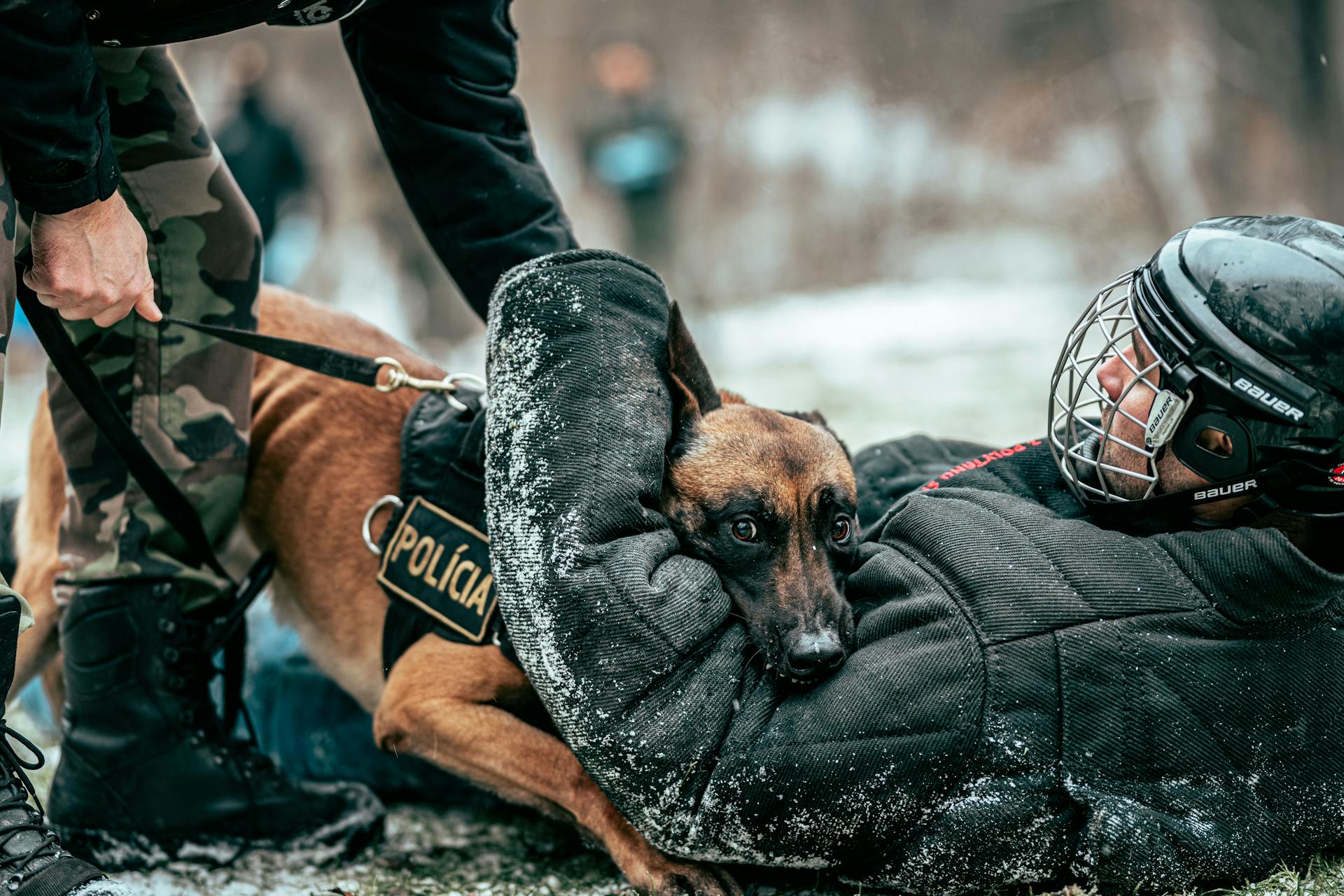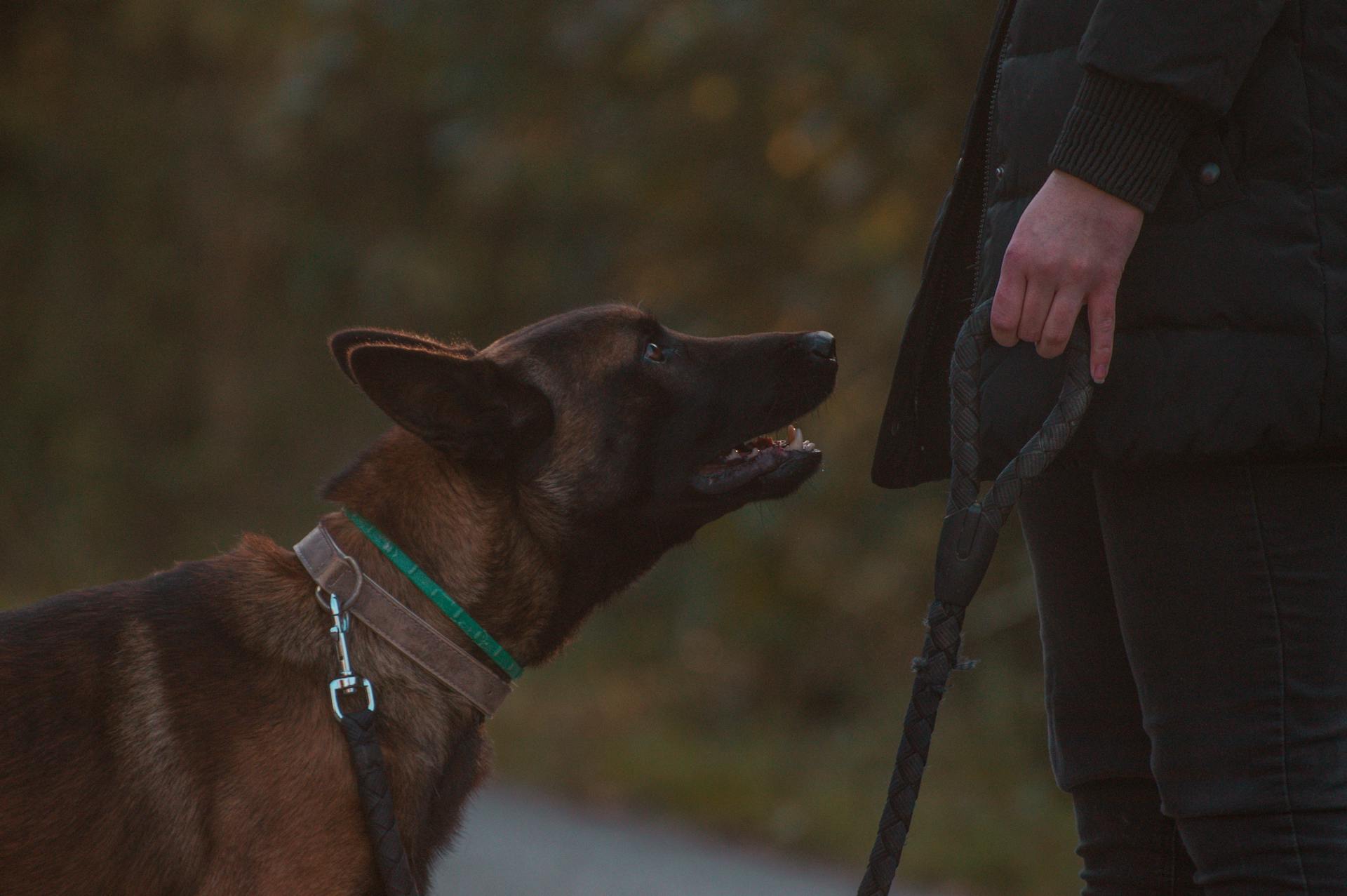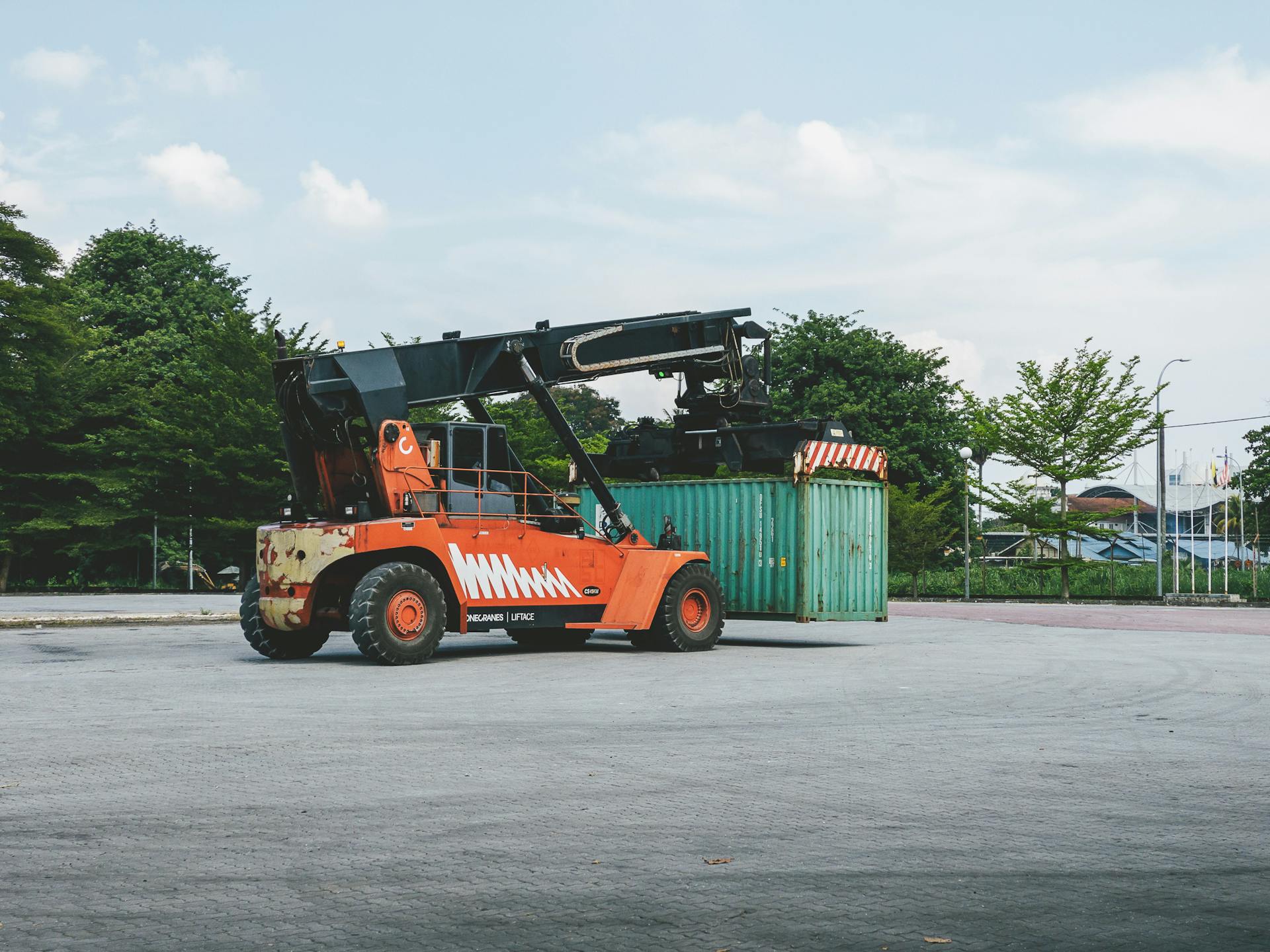
Becoming a police K9 handler is a dream job for many animal lovers. To start your career, you'll need to meet the basic requirements, which typically include being a sworn law enforcement officer with at least one year of experience.
You'll also need to go through a rigorous selection process, which may involve a written exam, physical fitness test, and interview with a panel of experts. This is to ensure you have the skills and temperament to work with a highly trained canine partner.
As a police K9 handler, you'll be responsible for the safety and well-being of your dog, as well as your own. You'll need to be physically fit and able to work in a fast-paced, high-stress environment.
A fresh viewpoint: Sar Dog Handler
What It Takes to Be a Police K9 Handler
Being a police K9 handler is an incredibly demanding job, both physically and emotionally. It requires a high level of fitness to keep up with the dog, even from a distance.
One of the biggest challenges of being a K9 handler is the level of responsibility involved. The handler is solely responsible for the dog's welfare and care, which can be overwhelming, especially considering the demanding nature of the job.
To be a successful K9 handler, you need to be incredibly patient and compassionate. You'll have to create a strong bond with your animal, which takes hard work, repetition, and dedication.
K-9 handlers must also be prepared to continue training every day, as the connection between a working dog and their handler is based on utmost trust and loyalty. This bond is essential to a good partnership.
Here are some key skills required to be a K9 handler:
- Patience
- Compassion
- Good work ethic
- Ability to create a strong bond with an animal
The "one dog, one handler" policy in the military is a great example of how important this bond is. It's not just a job, it's a partnership based on trust and loyalty.
Becoming a Police K9 Handler
To become a police K9 handler, you'll typically need to have worked at a law enforcement agency first. The amount of experience required varies from agency to agency.
Working with dogs is just a part of the job as a handler – you'll also be responsible for patrol work and administrative tasks. Volunteering to help with established K9 teams can be a great way to gain experience and build your skills.
After completing the application and interview process, you'll be assigned a dog from the agency or a vendor. You'll then need to undergo education to learn how to work with your new K9 partner.
For more insights, see: Police Working Dogs
Process for Becoming
Becoming a Police K9 Handler requires a significant amount of experience in law enforcement, typically several years of working at a law enforcement agency.
In most cases, you'll need to have worked at a law enforcement agency before being considered for the K9 unit, with the exact amount of experience varying from agency to agency.
If this caught your attention, see: Police K9 Case Law
Working with dogs is just one part of the job as a handler - you'll still be responsible for patrol work and administrative tasks.
Volunteering to help with established K9 teams can be a great way to gain experience and build a strong foundation for a future K9 spot.
Laying trails and participating in training scenarios can provide valuable learning opportunities and help you develop your skills.
After the application and interview process, you'll be assigned a dog from the agency or choose one from a vendor or breeder.
Next, you'll receive education on how to work with your new K9 partner, which is a crucial step in becoming a successful handler.
Training a police dog requires constant rehearsal and hours of ongoing training, which can be intense and demanding.
For your interest: Military Working Dog Handler
Sargent's Story
Sargent is a 9½-year-old Belgian Malinois and senior team member of the Fontana police K-9 unit in California.
Sargent's handler, Officer Mark Wyrick, spent time on the traditional police force before applying to the specialized K-9 team.
Wyrick was paired with Sargent and they went through a 240-hour training course to make them a skilled team.
Sargent, like all dogs currently on the Fontana force, is cross-trained in two specialties: suspect apprehension and narcotics/firearms detection.
Even Sargent, who is near retirement age, takes part in 10-hour practice sessions with the unit and individual training with Wyrick during their shift.
Wyrick has a bite sleeve and other training tools in his patrol vehicle so he can meet up with another K-9 unit for some in-field practice.
The Fontana K-9 Unit has strong community involvement, thanks in part to the civilian-led support group, Fontana Police K9 Pals.
Sargent's training is continuous, not just during his initial 240-hour training course.
Sargent's commands are all in French, and he responds quickly and accurately to his partner, Officer Wyrick.
Sargent's work is physically demanding, but he gets to rest in his kennel in Wyrick's patrol vehicle or at his home with his handler's family.
For another approach, see: Border Patrol Canine Unit
Working Humans
As a police K9 handler, you'll be part of a tight-knit team that relies on each other's skills and strengths. You'll need to be physically fit, able to keep up with your canine partner's training and deployment schedule.
Your work schedule will directly impact your dog's diet, so be prepared to adjust their food intake accordingly. Sargent, the police dog in the article, eats 4 to 5 cups of Canidae dog food daily, depending on the work schedule.
You'll also need to consider your dog's mental health and well-being, just like you would your own. Sargent's handler monitors his weight and uses flea/tick medicine to prevent health issues.
As a handler, you'll be responsible for your dog's grooming needs, just like Sargent's handler. They groom him themselves with monthly baths and daily inspections to ensure no health issues arise.
Worth a look: How Long Do Police Dogs Work
Education
Education is a crucial part of becoming a police K9 handler. It's not just about learning how to work with a dog, but also about understanding the training process and how to deploy your K9 for success.
At Highland Canine Training, dogs receive 16 weeks of training prior to handler school. This ensures that the dog is well-prepared for the next step in their training.
Handler education typically lasts from two to four weeks, depending on the level of training required. This is an important step for new handlers, as they learn how to set out training exercises and read and work the K9 through its necessary work.
The handler program focuses on hands-on training with their new partner, building on the dog's existing training. This is made possible by completing online training prior to the in-person portion of the education.
Once handler school is complete, the new K9 team will be ready to work operationally. However, ongoing training is essential to keep the dog's skills sharp and prevent them from becoming stale.
For more insights, see: Alexander Dog Handler
Detection and Tactics
Emphasis is placed on officer safety when working with police dogs, with courses teaching and emphasizing sound and fundamental tactics to ensure handler safety.
Training for detection dog handlers is crucial, and courses stress the importance of fundamental skills such as managing the dog effectively and recognizing changes in behavior and odor.
Detection dog handlers must also learn to maintain the dog's training correctly, including proofing the dog and ensuring they ignore confounds and other odors that can distract them.
Our comprehensive three-week detection k9 handler training course covers topics like Record Keeping and Report Writing, Scent Theory and Basic Detection, and Canine Case Law.
For more insights, see: Dog Handlers
Detection
Detection dog handler training is crucial for developing an effective Police K9 detection dog team. It's essential for handlers to understand the concepts and fundamentals of training and handling detection dogs.
Detection dog training involves teaching the dog to recognize a change in breathing, a change in behavior, and final indication on target odor. This requires seamless handling skills, which can be challenging for novice handlers.
At Highland Canine Training, LLC, comprehensive three-week detection k9 handler training courses are included with the cost of any detection dog. This course covers practical exercises, lecture, and topics such as Record Keeping and Report Writing, Scent Theory, and Basic Detection.
Consider reading: Dog Handlers for Dog Shows
Specialized detection K9 handler training courses pair the handler and dog, training them together from start to finish. This creates a solid, well-trained team upon departing from the course.
Basic narcotics detection dog handler courses are comprehensive and taught by current and former law enforcement K9 handlers and supervisors. Topics covered include Basic Odor Theory, Proper Handling Techniques, and Recognizing Narcotics.
Advanced narcotics detection dog handler courses teach handlers more advanced skills, including Advanced Drug Dog Handling Skills, Recognizing Narcotics, and Advanced Detection & Interdiction Methods.
Explosive detection dog handler courses are also offered, with basic courses covering Basic Odor Theory, Proper Handling Techniques, and Recognizing Explosives and IED's. Advanced courses cover topics such as Advanced EDD Handling Skills and Effective EDD Roadway Clearing.
Police K9 handler training courses can be customized to fit departmental needs and are taught by current and former law enforcement handlers.
Garmont's Tactical Collection
Garmont's Tactical Collection is designed for professionals who require high-performance footwear.
These boots are built with a focus on durability, featuring a rugged outsole that can withstand harsh environments.
The collection includes models like the Garmont T8, which has a unique lug pattern for improved traction on various terrain.
Garmont's Tactical Collection also offers a range of colors and styles to suit different operational needs.
One notable feature is the use of high-quality materials, such as full-grain leather, to ensure the boots can withstand the rigors of tactical work.
K9 Handler Careers
Becoming a K-9 handler is a rewarding career that requires dedication and hard work. It's a highly specialized and respected role in the military, where you'll have a smart and loyal friend by your side.
Working with a K-9 dog means performing incredibly significant work in the Armed Forces, and it's a career that's worth the challenge. Military working dogs and their handlers are highly valued for their service.
Consider reading: K9 Military Dogs
A Rewarding Career
Becoming a K-9 handler is a challenging but rewarding career choice. It's a job that requires dedication, hard work, and a strong bond with your canine partner.
Working with a K-9 dog means you'll have a smart and loyal friend by your side. Military working dogs perform incredibly significant work in the Armed Forces.
Their roles are highly specialized and respected, making it a career that's truly valued and appreciated.
K-9 Military Roles
K-9 military roles are incredibly diverse and vital to the success of military operations.
Sentry/Border Patrol Dogs are trained to warn troops of an imminent threat by growling or barking, and they perform this task at night in low visibility.
Scout/Patrol Dogs detect snipers or ambushes in complete silence, alerting their handlers through a stiff pose or twitching their ears in a specific way.
Some dogs are specialized to search for specific things, like Explosive Detection Dogs, which use their heightened sense of smell to sniff out chemicals used in making weapons.
Narcotic Detection Dogs search for narcotics, reporting the location to their handlers.
Casualty/Search and Rescue Dogs are trained to search for dead or wounded in obscure or hard-to-reach places, and they save many lives.
Here are the different types of K-9 military roles:
Sources
- https://tacticalpolicek9training.com/how-to-become-a-police-k9-handler/
- https://tacticalpolicek9training.com/police-k9-handler-courses/
- https://www.dogster.com/lifestyle/inside-the-life-of-a-police-dog
- http://k9gta.com/k9-services/k9-training/police-k9-training/
- https://garmonttactical.com/post/k-9-dogs.html
Featured Images: pexels.com


